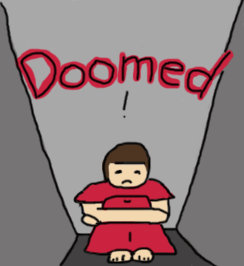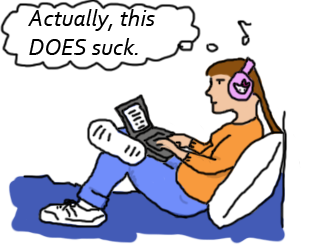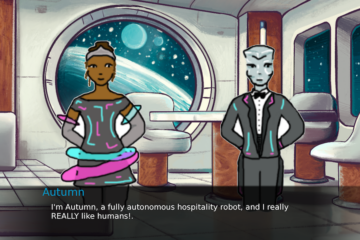Another requested topic! If there’s one thing a writer does more than write, it’s get rejected!
… I really wish it were the other way around…
Anyway, it can be hard to tell by looking at me now, when I proudly show off hundreds of rejections in my statistics, but there was a time when I, too, reacted to a form letter with sobs, presentiments of personal doom, and questioning whether I should continue to try breathing in and out, much less writing. Here is a visual representation of my mental state after each of my first, oh, 400 or so rejections:

And here’s a rough approximation of my attitude when I get a rejection today:

How did I go from emotionally crushed to mildly annoyed? Well, let’s look at my strategies. Not all of them will work for every writer, but they may help?
1. Desensitization
The more you get rejected, the less each individual rejection hurts. My sister challenged me to get a hundred rejections, saying she’d give me a prize. That challenge turned my writing-life around. Collecting rejections like they were Pokemon turned them from third degree burns on my self-worth to paper cuts.
That said, it took a lot longer that I would have guessed to stop feeling miserably stung each time. Don’t feel bad about yourself if you’re still crying under the bed on rejection 500. I was.
And then you get AGENT rejections and NOVEL rejections, VIDEO GAME rejections … each one is like starting all over with my desensitization. I’m not sure if this is because of incurable optimism or very fragile self-esteem.
But nothing works like that good old desensitization. The second 100 were easier than the first, and the third were easer than the second. The ones that sneak up and stab you in the heart will get less-frequent. Think if it like building callouses. Sure, the horny hand of a seasoned gardener can still get hurt, but she won’t feel the edge of a blade of grass like a soft-palmed never-gardener.
2. Disassociate
“They rejected me!” is the most inaccurate sentence in this business. “They rejected my story” is also inaccurate. What would be more accurate is, “This editor has decided against buying this particular story at this particular time for their upcoming story needs, either because they didn’t care for it, or because of a myriad of other reasons completely opaque to me that may have nothing to do with the story’s qualities nor me.”
We tend to think of our work as a part of our sense of self. This is my soul, laid bare in prose, even if it’s a 250-word joke piece about lonely AIs acting like ghosts.
If you’re shopping around your First Really Good Piece, it can feel like you are submitting your very hopes and dreams. That’s why I recommend to students to start a new story before they start submitting. It helps that I have 18 stories out on submission right now. Each one is only 1/18th of my hopes and dreams, and let’s be real, the odds a VERY good that all 18 will be rejected. I have to not care that much.
I have to separate myself from my work. Separate my sense of self-worth from acceptance. It’s … hard. Sometimes all I can do is imagine the story was written by someone else.
When my lovely writer friends are rejected, I don’t think it reflects poorly on them or their writing ability. I don’t like them less. I am, in fact, supportive and understanding and feel connected to them in the great bond of rejection. So why not treat myself the same??
3. Focus forward, not back
“The only cure for rejection is to have the next place ready to send it to,” someone once told me. Someone very wise but very long ago so I have forgotten who. It’s good advice and I pass it on to all new writers who ask me about submitting their work. As soon as you click submit, have a plan for where you’ll send it after the rejection.
Also, work on other things. Right now, I’m working on 2 novels, an interactive fiction, and I have 7 stories in my “WIP” list waiting to be gotten back to. I just finished up 2 stories and an essay for a contest. My writing life is a constant stirring of pots on all burners of the stove. A comfortable melange of something always being almost done, something always being just started. That’s the way I work best, but I know it’s not for everyone.
The point is more: look forward, not back. When you read that rejection letter, have half your mind on your next project.
I used to save my rejection letters, back when they were paper. I had an idea to wallpaper a room with them. Eventually, I threw them out. I also delete every rejection email as soon as I finish recording the rejection in my accounting system. (I use The Submission Grinder, but I started out with a spreadsheet and also with a home-built database. Whatever works for you!)
3-a. Make Rejection a Process, not an Event.
This was going to be part of the above paragraph, but I realized it needed the emphasis of a heading.
It’s important to have a way of tracking your submissions so you don’t accidentally simultaneously submit somewhere that doesn’t allow simultaneous submissions, and also so that you don’t accidentally re-submit somewhere. But it’s also good for making rejection a non-event. Just an entry in the ledger. Work out a system that works for you. For me it’s:
- Receive rejection
- Record rejection
- Send story back out
- This involves using The Submission Grinder to find an open market that pays pro rates that hasn’t had this story yet, or doesn’t have a story of mine at it already. I sort by speed of response. Quickest first.
- If no open market is available for this story, make a calendar event to search again at the start of the next month
- Delete rejection
- Stop thinking about it
4. Be the successful you
Sometimes all I can do is role play Famous Author Reasie. How would you feel if John Scalzi or Neil Gaiman were whining about getting a rejection? You’d drag out the world’s tiniest violin. So I remind myself that if, against all odds, I am someday famous, I won’t want such self-pity to be on the public record, and I suck it up.
OR…
We’ve ALL heard the stories about how many times Super Famous Novel was rejected, or how Legendary Author couldn’t get into his local paper’s literary contest. Right?
So I simply sigh and think, “Ah, good, more fodder for my backstory, proving I Paid My Dues. Bring it on, slush readers. Mama needs to not engender seething envy after her fourth movie deal!”
5. The Fools, the FOOLS! They shall rue the day!
It started out as a joke, but I find occassionally it helps to pretend I’m a supervillain when I get rejections.
Also, I have gone over some of my past rejections just now for this article and there IS something very validating seeing all the form rejections for stories that got long-listed for the Hugo or won other awards.
Ah, so sorry you didn’t want that award winning piece that’s been reprinted twice now in “best of” collections, tiny magazine! AH, smug mode.
(Caveat: of course, as I stated at the beginning of this article – they weren’t saying no to the STORY but the story might not have fit what they think their readers want or what they had space/budget for.)
… and if all of that doesn’t help, you can always warm your heart going over my latest rejection statistics. Last year was an exceptionally good year to reject me.


